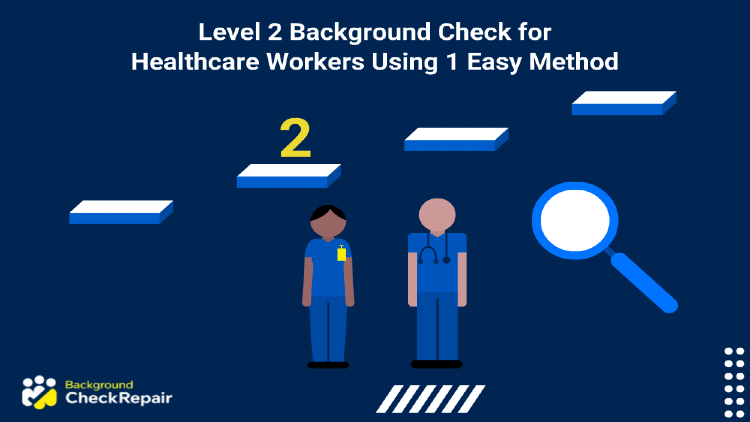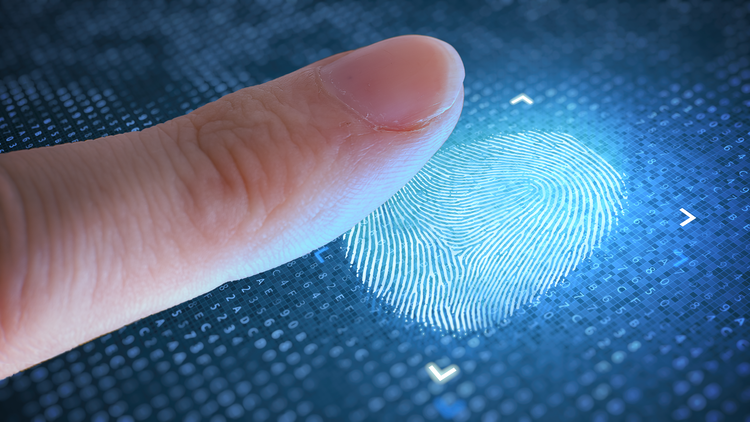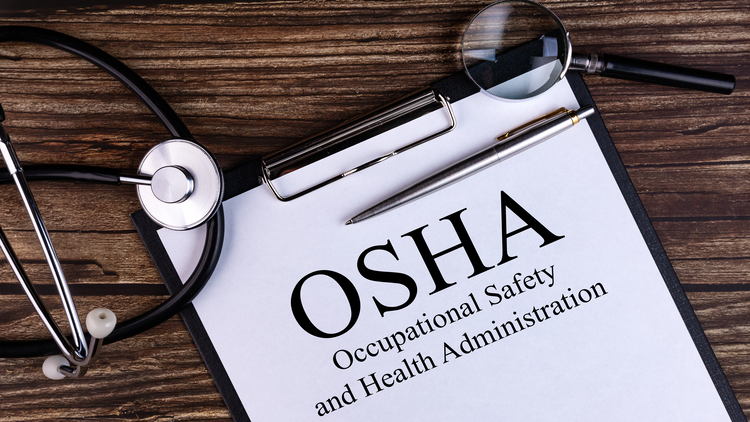We use cookies to ensure that we give you the best experience on our website. If you continue to use this site we will assume that you are happy with it
Level 2 Background Check for Healthcare Workers Using 1 Easy Trick
 Written by Background Check Repair
Written by Background Check Repair
Background Checks | June 10, 2024

Table of Contents
When applying for a job in the medical field, it is important to know how to obtain and pass a level 2 records check for healthcare workers. Simply put, they require specific laws that must be followed.
This is because healthcare and nursing background investigations are designed to protect vulnerable groups such as children, the elderly, and those under medical care.
Fortunately, there is one easy trick that speeds the process by utilizing a screening method that abides by all healthcare laws and statutes: fingerprint background screenings designed for those in the medical field.
Since the laws that involve working with patients are updated regularly, knowing the best method for complying with both state and federal guidelines can be tricky.
In fact, under the Patient Protection and Affordable Care Act, mandatory background investigations are issued at the state level, but not all fifty states require the same level of search. However, some form of screening is required by both federal and state laws for all healthcare workers.
That is why level 2 background checks require fingerprinting. Thanks to technology, this process can now be conducted using one easy trick: digital Fingerprinting services through an expedited channeler.
The digital method ensures that employers and applicants can get approval to work as soon as possible, as long as their criminal and other history checks are clear.
When conducting (or undergoing) a level 2 background check for healthcare workers, expedited fingerprint services can help make the process much faster, often returning information within 48 hours.
What Is Live Scan Fingerprinting (Digital Fingerprint Scanning)?
Fast-track background check services are now available for those in the medical community due to a technology known as digital or live scan fingerprinting, which captures fingerprints electronically, rather than through the traditional ink and paper.

Currently, digital scanning is the option used for storing federal fingerprint records, since it allows law enforcement agencies to keep a warrant search and other records online. This technology has helped make fingerprinting faster and easier.2
However, it’s important to note that not all states allow live scan fingerprinting services, and some states have conditions attached to the process, including California, Illinois, and Florida.
How To Get Digital Fingerprinting Done
Nurses, doctors, healthcare administration workers, healthcare providers, and other health personnel undergo background checks.
To speed up the fingerprinting process of a level 2 background check for healthcare workers, follow these steps to get a digital submission:
Step 1
Obtain a request form from the employer or agency (usually the background check company) that needs the fingerprints, or the Originating Agency Identifier (ORI) number.
A special form is required for this method, providing authorization for a digital fingerprinting service to accept and submit your fingerprints to criminal justice system databases and other background check searches. Typically these include special identifiers that protect your prints. In some states, an ORI number is sufficient.
Step 2
Research the digital fingerprinting locations in the state as well as any applicable laws.
This is as simple as performing a Google search, but may even be easier. Typically, the request form provided will also come with a list of service locations that can perform the scan. Once there, applicants allow the technician to fingerprint them, using the digital system.
Step 3
Make payment for the fingerprinting service.
Once paid, that’s all there is to it. The fingerprints are sent to the Department of Justice, (as well as any indicated court records databases) which returns the criminal history information to the agency that requested the background check.
Occasionally, fingerprints will be rejected for one reason or another, and in that case, the digital fingerprint scan company will usually have methods in place to re-perform the scan.
During the fingerprinting appointment, make sure to ask for the Transaction Control Number, this makes it possible to track the status of the background screening. After following these steps, users obtain results from the potential workplace (or agency that requested the criminal history search) within a few days to a week.
How Does Digital Fingerprinting Work?
While digital fingerprinting makes the screening process for healthcare workers much easier, it must be done correctly. If not, a background check might be delayed or altogether halted. This could result in serious delays in the hiring process, and impact both employees and employers.
When arriving to have fingerprints captured, a skilled technician assists in the process. This is done to ensure that the fingerprints are scanned correctly and to limit the amount of errors.
The fingerprinting method includes the following safeguards:
- Before the technician takes someone’s fingerprint, the technician must calibrate the live scan machine, to ensure it is in working order. This process will differ depending on the manufacturer of the machine, so the technician must follow the machine’s specific instructions.
- Next, the technician will take the Social Security Number, name, birthdate, place of birth, and other identifying information from the person submitting their fingerprint, to ensure that their information is connected to the correct fingerprint. This is vitally important and the reason that all information should be double-checked to verify accuracy before beginning the scan.
- When taking someone’s fingerprint, the technician must be sure to capture the center of the print’s patterns. Each fingerprint is made up of two parts- the slaps and the rolling print. The slaps are captured when the tip of the finger presses against the machine, while the rolling prints are captured when the finger is gently rolled across the printing machine’s surface.
When capturing slaps, the technicians should ensure that all of the fingers are laid flat and firmly on the machine, so that the entire print is captured. While capturing rolling prints, the technician must make sure that the person rolls their finger from nail to nail, again, so that the entire print is captured. It is also important that the technician records the prints from the requested fingers, depending on what is required for the background check. This can vary from state to state.
However, occasionally some problems occur while trying to capture fingerprints. For instance, slippage may happen if the subject’s fingers are moist or if their fingers are rolled too quickly. To prevent slippage, technicians usually have paper towels on hand, and roll fingers slowly, so that the entire print can be captured without smears.
The technician must also ensure that the finger maintains contact with the machine’s surface for the entire rolling print, otherwise, there could be poor image quality. Alternatively, a subject’s hands may be too dry for a proper roll. To prevent this, technicians typically keep a spray bottle of water or lotion on hand.
A trained digital fingerprint technician will also make sure that fingers are pressed down firmly with enough pressure so that the images captured are of high quality.
While live scan makes capturing fingerprints more efficient and easy, it must be done correctly in order to be sufficient for a healthcare worker (or any level 2) background check.
Criminal Screening To Work in the Health Care Industry Laws: Fingerprinting and Employment
Currently, 36 US states have varying legislation that requires healthcare professionals to receive criminal background checks before beginning work. While 14 states do not have official laws requiring screenings, most hospitals and healthcare facilities in these states still require some level of background checks, especially related to Medicare and Medicaid-accepting facilities.
In fact, many states have recently enacted new laws, to enhance the screening process for those in the medical field.

For example, in New York as of 2018, all healthcare workers that provide health home care management now need to receive a fingerprint background check. Similarly, a nationwide study found that 41 states require background checks for home health agencies,
Currently, there are no federal or nationwide laws for home health agencies to conduct national background screenings for potential employees.
However, the Nationwide Background Check Program grants funds to states that implement legislation to require in-depth background screenings for long-term healthcare employees. This demonstrates how the federal government is working to encourage states to require both statewide and FBI background checks for healthcare workers.
There is current federal legislation for healthcare facilities to conduct screenings on a statewide basis, which would only include a name-based search, and not necessarily a fingerprint screening. This requirement was introduced by Section 6201 of the Patient Protection and Affordable Care Act, a 2010 healthcare reform act.4
Healthcare Employer Requirement for a Background Check or Background Screening
Remember that each state has its own statutes concerning what type of background check is required for working in the medical field. While some workers may need fingerprint checks in some states, others may just require a name-based search, so it’s a good idea to research the laws that exist in the state where the application is being submitted.

In general, most healthcare background checks include a national criminal search, a national sex offender search, a drug screening, a past employment and education search, and an identity verification check.5
Prior employment and education verification is often done to ensure that healthcare workers have the proper credentials to provide medical care safely and legally. Furthermore, verifying where a potential employee worked prior will help reveal if they were fired due to negligence, abuse, or a related reason.
Do Background Checks Vary by State, Like Florida?
In the state of Florida, a background check must be run on any individual applying to jobs of elevated responsibility or trust, including those in a hospital, doctor’s office, or other medical facility. This helps ensure that patients, as well as their information, are kept safe and secure. It also helps verify that providers have the correct credentials to provide proper care to patients, since a level 2 background check screens for educational background.
Florida has several public agencies to regulate background checks. For example, the Florida Department of Law Enforcement (FDLE) facilitates both state and national criminal history record checks, specifically for governmental agencies, such as public healthcare organizations.
Private healthcare organizations may use other companies to perform background checks, but can still solicit the services from the FDLE. Before consenting to a background check for a job in the medical field in Florida, be sure to ask the hiring manager how to obtain the proper screening for the specific workplace.

The FDLE check includes a search of an employee on the following databases, which include both state and national records:
- FL Criminal History Central Repository for State Arrests
- The nationwide criminal records database at the FBI for federal arrests and arrests from other states
- The Florida Crime Information Center for warrants and domestic violence injunctions.
When submitting fingerprints for a background check to the FDLE, applicants are usually required to provide their full legal name, address, social security number, date of birth, race, and gender. This helps screen for information aside from criminal records such as credit history and education, which are not tied to fingerprints.
The Agency for HealthCare Administration (AHCA) is another public agency that processes screening results, specifically for healthcare workers in Florida. The AHCA background screening is used specifically for medical providers licensed by the AHCA.3
The AHCA also maintains and administers the Care Provider Background Screening Clearinghouse, specifically for screenings for positions that provide services to the elderly, persons with disabilities, and children. It is the official data source for the screening results specifically for candidates applying to work with these vulnerable populations.
The state of Florida outlines in its 2021 Florida Statutes that specific offenses disqualify an individual from passing a level 2 background check.
Some of the crimes that disqualify a potential employee include:
- Sexual misconduct, especially with developmentally disabled individuals
- Adult abuse, neglect, or exploitation
- Assault, battery, and kidnapping
- Resisting arrest
- Negligent treatment of a child
- Burglary, arson, or theft
- And any violent crimes
Speeding up the process for submitting to a level 2 background check for healthcare workers gives both employers and medical professionals the ability to start work faster, without compromising safety.
References
1PrintScan. Get An FBI Background Check In 24 Hours. Nd. 3 December 2021. Web. <https://www.printscan.com/services/expedited-fbi-background-check/>
2Wikipedia. Live scan. Nd. 3 December 2021. Web. <https://en.wikipedia.org/wiki/Live_scan>
3Agency for Health Care Administration. Better Healthcare for all Floridians. Nd. 3 December 2021. Web. <https://ahca.myflorida.com/index.shtml>
4Innovative Architects. Federal Background Screening Laws for Healthcare Workers. Nd. 8 December 2021. Web. <https://www.innovativearchitects.com/KnowledgeCenter/industry-specific/healthcare-background-screening-laws.aspx>
5Rodgers, M. Healthcare Background Checks: A Complete Guide [2021]. 29 November 2021. 8 December 2021. Web. <https://iprospectcheck.com/healthcare-background-checks/>
